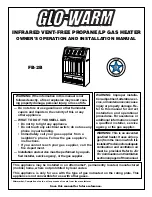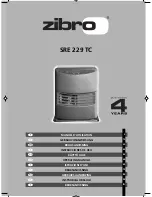
11
CARE AND MAINTENANCE
Cleaning
Abrasive cleaners will damage this product.
Never use oven cleaner to clean any part of fire table.
Do not clean any fire table part in a self-cleaning oven. The extreme heat will damage the finish.
More frequent cleaning may be required as necessary. It is imperative that control compartment,
burners and circulating air passageways of the fire table be kept clean.
Spiders and insects can create a dangerous condition that may damage fire table or make it
unsafe. Keep burner area clean of all spiders, webs or insects. Clean burner holes by using a
heavy-duty pipe cleaner. Compressed air may help clear away smaller particles.
Carbon deposits may create a fire hazard.
Do not clean fire table with combustible or corrosive cleaners. Use warm, soapy water.
This fire table should be thoroughly cleaned on a regular basis.
Wipe surfaces clean with mild dish detergent or baking soda. Rinse clean with water.
For stubborn surfaces use a citrus-based degreaser and a nylon scrubbing brush.
After the burner and rocks are completely cooled down, use a soft brush to get rid of the mild
stains, loose dirt and soil. Wipe with a soft cloth.
Stubborn stains, discoloration and possible rust pitting can occur from exposure to harsh outdoor
conditions.
Be careful not to let any powder or solvent come in contact with painted or plastic components
as damage may occur.
Note:
While cleaning the unit, be sure to keep the area around the burner dry at all times. Do not
submerge the control valve assembly. If the gas control is submerged in water, do NOT use it. It
must be replaced.
Maintenance
Keep exterior surfaces clean.
Store the fire table in a cool dry place away from direct sunlight.
The propane cylinder must be disconnected and stored outdoors before the fire table can be
stored indoors.
Use Manufacturer approved or supplied replacement parts and accessories only. Otherwise may
void the warranty of this product and result in a hazardous condition.
Please contact the Manufacturer for information regarding replacement, valves, ignitor, regulator
etc.
Air flow must be unobstructed. Keep controls, burner and circulating air passageways clean.
Signs of possible blockage include:
Gas odor with extreme yellow tipping of flame.
This unit does NOT reach the desired temperature.
This unit glow is excessively uneven.
This unit makes popping noises.
Note:
In a salt-air environment (such as near an ocean) corrosion occurs more quickly than normal.
Frequently check for corroded areas and repair them promptly.


































